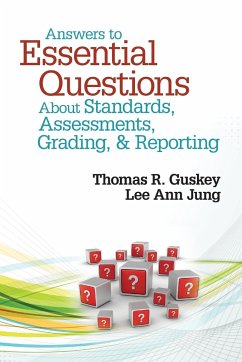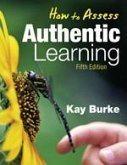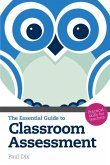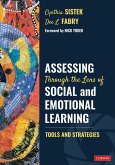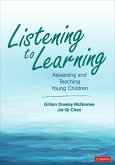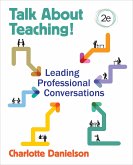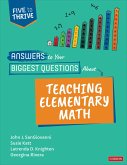Thomas R. Guskey, Lee Ann Jung
Answers to Essential Questions About Standards, Assessments, Grading, and Reporting
Thomas R. Guskey, Lee Ann Jung
Answers to Essential Questions About Standards, Assessments, Grading, and Reporting
- Broschiertes Buch
- Merkliste
- Auf die Merkliste
- Bewerten Bewerten
- Teilen
- Produkt teilen
- Produkterinnerung
- Produkterinnerung
Easy to use guide on assessment for learning, answering common questions about 21st century standards and grading considerations.
Andere Kunden interessierten sich auch für
![How to Assess Authentic Learning How to Assess Authentic Learning]() Kathleen B. BurkeHow to Assess Authentic Learning52,99 €
Kathleen B. BurkeHow to Assess Authentic Learning52,99 €![The Essential Guide to Classroom Assessment The Essential Guide to Classroom Assessment]() Paul DixThe Essential Guide to Classroom Assessment24,99 €
Paul DixThe Essential Guide to Classroom Assessment24,99 €![Assessing Through the Lens of Social and Emotional Learning Assessing Through the Lens of Social and Emotional Learning]() Cynthia SistekAssessing Through the Lens of Social and Emotional Learning31,99 €
Cynthia SistekAssessing Through the Lens of Social and Emotional Learning31,99 €![The Power of Assessment for Learning The Power of Assessment for Learning]() Margaret HeritageThe Power of Assessment for Learning35,99 €
Margaret HeritageThe Power of Assessment for Learning35,99 €![Listening to Learning Listening to Learning]() Gillian Dowley McNameeListening to Learning26,99 €
Gillian Dowley McNameeListening to Learning26,99 €![Talk about Teaching! Talk about Teaching!]() Charlotte F. DanielsonTalk about Teaching!31,99 €
Charlotte F. DanielsonTalk about Teaching!31,99 €![Answers to Your Biggest Questions about Teaching Elementary Math Answers to Your Biggest Questions about Teaching Elementary Math]() John J. J. SanGiovanni (Howard Public School System)Answers to Your Biggest Questions about Teaching Elementary Math27,99 €
John J. J. SanGiovanni (Howard Public School System)Answers to Your Biggest Questions about Teaching Elementary Math27,99 €-
-
-
Easy to use guide on assessment for learning, answering common questions about 21st century standards and grading considerations.
Hinweis: Dieser Artikel kann nur an eine deutsche Lieferadresse ausgeliefert werden.
Hinweis: Dieser Artikel kann nur an eine deutsche Lieferadresse ausgeliefert werden.
Produktdetails
- Produktdetails
- Verlag: SAGE Publications Inc
- Seitenzahl: 176
- Erscheinungstermin: 21. November 2012
- Englisch
- Abmessung: 229mm x 152mm x 10mm
- Gewicht: 268g
- ISBN-13: 9781452235240
- ISBN-10: 1452235244
- Artikelnr.: 36131656
- Herstellerkennzeichnung
- Libri GmbH
- Europaallee 1
- 36244 Bad Hersfeld
- gpsr@libri.de
- Verlag: SAGE Publications Inc
- Seitenzahl: 176
- Erscheinungstermin: 21. November 2012
- Englisch
- Abmessung: 229mm x 152mm x 10mm
- Gewicht: 268g
- ISBN-13: 9781452235240
- ISBN-10: 1452235244
- Artikelnr.: 36131656
- Herstellerkennzeichnung
- Libri GmbH
- Europaallee 1
- 36244 Bad Hersfeld
- gpsr@libri.de
Thomas R. Guskey, Ph.D., is professor of Educational Psychology at the University of Kentucky. Benjamin Bloom served as his advisor during his years of graduate study at the University of Chicago, as the director of his doctoral dissertation committee, and later as a colleague on several large-scale research projects.
Acknowledgments
About the Authors
Preface: The Nature of Essential Questions
Part I: Standards
1. What are Standards?
2. Are Standards a New Idea in Education?
3. Why Do Some People Oppose Standards?
Part II: Assessments
4. What Is Assessment?
5. What Is the Difference Between Assessments and Tests?
6. What Is Formative Assessment?
7. Why Are Formative Assessments Important?
8. What Are Common Formative Assessments?
9. What Is Summative Assessment?
10. What Is High-Stakes Assessment?
11. What Are Instructionally Sensitive and Instructionally Insensitive
Assessments?
12. How Do Assessments for Learning Differ From Assessments of Learning?
13. Do Formative Assessments Improve Student Learning?
Part III: Grading
14. What Are Grades?
15. What Is the Purpose of Grading?
16. Are Grades Essential to Teaching and Learning?
17. Why Are the First Grades Assigned So Important?
18. Do Low Grades Prompt Students to Try Harder?
19. Why Is Setting Percentage Cut-Offs for Grades an Arbitrary Process?
20. What Is Wrong With Grading on the Curve?
Part IV: Reporting
21. What Criteria Do Teachers Use in Assigning Grades?
22. What Is Standards-Based Grading and Reporting?
23. Why Do Some Parents Have Concerns About Standards-Based Grading and
Reporting?
24. If Schools Implement Standards-Based Grading, Will the Grades Assigned
to Students Likely Go Up or Down?
25. What Is the Most Important First Step in Implementing Standards-Based
Grading?
26. What Is the Best Way to Inform Parents About Moving to Standards-Based
Grading?
27. What Is the Best Way to Encourage Parents to Make Comments on the
Report Card?
28. Will Standards-Based Grading Improve Student Learning?
Part V: Grading and Reporting for Exceptional and Struggling Learners
29. Who are Exceptional and Struggling Learners?
30. How Do We Assign Grades to Exceptional and Struggling Learners Who
Require Modifications?
31. What Is the Difference Between Accommodations and Modifications?
32. How Do We Legally Report Grades for Exceptional and Struggling Learners
on Report Cards and Transcripts?
33. Do High School Students Requiring Modifications Receive Course Credit
Toward a Diploma? Do Modifications Make a Student Ineligible for
Extracurricular Activities, Such as Interscholastic Athletics?
Summary and Conclusions
Index
About the Authors
Preface: The Nature of Essential Questions
Part I: Standards
1. What are Standards?
2. Are Standards a New Idea in Education?
3. Why Do Some People Oppose Standards?
Part II: Assessments
4. What Is Assessment?
5. What Is the Difference Between Assessments and Tests?
6. What Is Formative Assessment?
7. Why Are Formative Assessments Important?
8. What Are Common Formative Assessments?
9. What Is Summative Assessment?
10. What Is High-Stakes Assessment?
11. What Are Instructionally Sensitive and Instructionally Insensitive
Assessments?
12. How Do Assessments for Learning Differ From Assessments of Learning?
13. Do Formative Assessments Improve Student Learning?
Part III: Grading
14. What Are Grades?
15. What Is the Purpose of Grading?
16. Are Grades Essential to Teaching and Learning?
17. Why Are the First Grades Assigned So Important?
18. Do Low Grades Prompt Students to Try Harder?
19. Why Is Setting Percentage Cut-Offs for Grades an Arbitrary Process?
20. What Is Wrong With Grading on the Curve?
Part IV: Reporting
21. What Criteria Do Teachers Use in Assigning Grades?
22. What Is Standards-Based Grading and Reporting?
23. Why Do Some Parents Have Concerns About Standards-Based Grading and
Reporting?
24. If Schools Implement Standards-Based Grading, Will the Grades Assigned
to Students Likely Go Up or Down?
25. What Is the Most Important First Step in Implementing Standards-Based
Grading?
26. What Is the Best Way to Inform Parents About Moving to Standards-Based
Grading?
27. What Is the Best Way to Encourage Parents to Make Comments on the
Report Card?
28. Will Standards-Based Grading Improve Student Learning?
Part V: Grading and Reporting for Exceptional and Struggling Learners
29. Who are Exceptional and Struggling Learners?
30. How Do We Assign Grades to Exceptional and Struggling Learners Who
Require Modifications?
31. What Is the Difference Between Accommodations and Modifications?
32. How Do We Legally Report Grades for Exceptional and Struggling Learners
on Report Cards and Transcripts?
33. Do High School Students Requiring Modifications Receive Course Credit
Toward a Diploma? Do Modifications Make a Student Ineligible for
Extracurricular Activities, Such as Interscholastic Athletics?
Summary and Conclusions
Index
Acknowledgments
About the Authors
Preface: The Nature of Essential Questions
Part I: Standards
1. What are Standards?
2. Are Standards a New Idea in Education?
3. Why Do Some People Oppose Standards?
Part II: Assessments
4. What Is Assessment?
5. What Is the Difference Between Assessments and Tests?
6. What Is Formative Assessment?
7. Why Are Formative Assessments Important?
8. What Are Common Formative Assessments?
9. What Is Summative Assessment?
10. What Is High-Stakes Assessment?
11. What Are Instructionally Sensitive and Instructionally Insensitive
Assessments?
12. How Do Assessments for Learning Differ From Assessments of Learning?
13. Do Formative Assessments Improve Student Learning?
Part III: Grading
14. What Are Grades?
15. What Is the Purpose of Grading?
16. Are Grades Essential to Teaching and Learning?
17. Why Are the First Grades Assigned So Important?
18. Do Low Grades Prompt Students to Try Harder?
19. Why Is Setting Percentage Cut-Offs for Grades an Arbitrary Process?
20. What Is Wrong With Grading on the Curve?
Part IV: Reporting
21. What Criteria Do Teachers Use in Assigning Grades?
22. What Is Standards-Based Grading and Reporting?
23. Why Do Some Parents Have Concerns About Standards-Based Grading and
Reporting?
24. If Schools Implement Standards-Based Grading, Will the Grades Assigned
to Students Likely Go Up or Down?
25. What Is the Most Important First Step in Implementing Standards-Based
Grading?
26. What Is the Best Way to Inform Parents About Moving to Standards-Based
Grading?
27. What Is the Best Way to Encourage Parents to Make Comments on the
Report Card?
28. Will Standards-Based Grading Improve Student Learning?
Part V: Grading and Reporting for Exceptional and Struggling Learners
29. Who are Exceptional and Struggling Learners?
30. How Do We Assign Grades to Exceptional and Struggling Learners Who
Require Modifications?
31. What Is the Difference Between Accommodations and Modifications?
32. How Do We Legally Report Grades for Exceptional and Struggling Learners
on Report Cards and Transcripts?
33. Do High School Students Requiring Modifications Receive Course Credit
Toward a Diploma? Do Modifications Make a Student Ineligible for
Extracurricular Activities, Such as Interscholastic Athletics?
Summary and Conclusions
Index
About the Authors
Preface: The Nature of Essential Questions
Part I: Standards
1. What are Standards?
2. Are Standards a New Idea in Education?
3. Why Do Some People Oppose Standards?
Part II: Assessments
4. What Is Assessment?
5. What Is the Difference Between Assessments and Tests?
6. What Is Formative Assessment?
7. Why Are Formative Assessments Important?
8. What Are Common Formative Assessments?
9. What Is Summative Assessment?
10. What Is High-Stakes Assessment?
11. What Are Instructionally Sensitive and Instructionally Insensitive
Assessments?
12. How Do Assessments for Learning Differ From Assessments of Learning?
13. Do Formative Assessments Improve Student Learning?
Part III: Grading
14. What Are Grades?
15. What Is the Purpose of Grading?
16. Are Grades Essential to Teaching and Learning?
17. Why Are the First Grades Assigned So Important?
18. Do Low Grades Prompt Students to Try Harder?
19. Why Is Setting Percentage Cut-Offs for Grades an Arbitrary Process?
20. What Is Wrong With Grading on the Curve?
Part IV: Reporting
21. What Criteria Do Teachers Use in Assigning Grades?
22. What Is Standards-Based Grading and Reporting?
23. Why Do Some Parents Have Concerns About Standards-Based Grading and
Reporting?
24. If Schools Implement Standards-Based Grading, Will the Grades Assigned
to Students Likely Go Up or Down?
25. What Is the Most Important First Step in Implementing Standards-Based
Grading?
26. What Is the Best Way to Inform Parents About Moving to Standards-Based
Grading?
27. What Is the Best Way to Encourage Parents to Make Comments on the
Report Card?
28. Will Standards-Based Grading Improve Student Learning?
Part V: Grading and Reporting for Exceptional and Struggling Learners
29. Who are Exceptional and Struggling Learners?
30. How Do We Assign Grades to Exceptional and Struggling Learners Who
Require Modifications?
31. What Is the Difference Between Accommodations and Modifications?
32. How Do We Legally Report Grades for Exceptional and Struggling Learners
on Report Cards and Transcripts?
33. Do High School Students Requiring Modifications Receive Course Credit
Toward a Diploma? Do Modifications Make a Student Ineligible for
Extracurricular Activities, Such as Interscholastic Athletics?
Summary and Conclusions
Index

